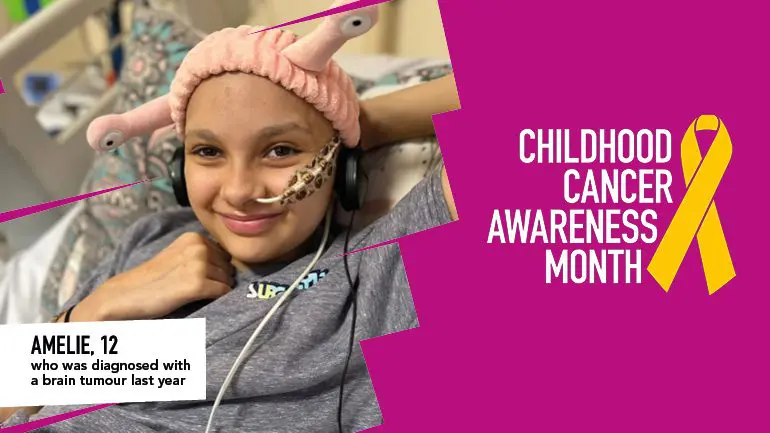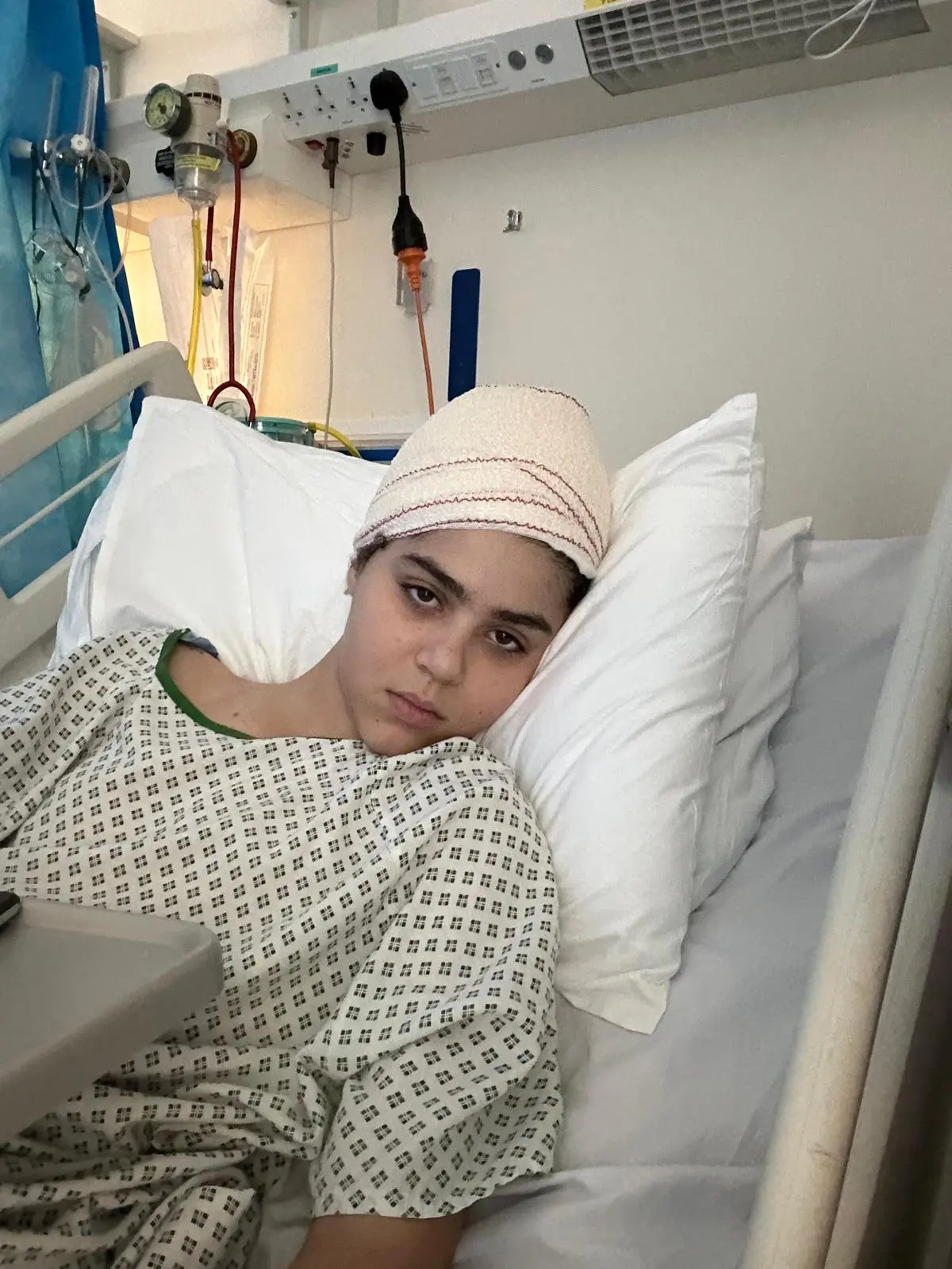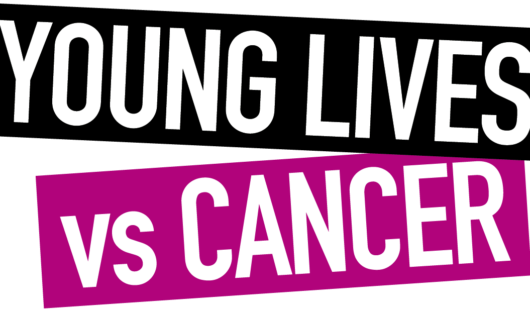Posted on Friday 6 September 2024
“Cancer made me feel isolated and lonely.” Children with cancer not receiving enough support for their mental wellbeing
Children with cancer and their families are not receiving enough support for their mental wellbeing during and following treatment, research shows.
This Childhood Cancer Awareness Month, Young Lives vs Cancer, the UK’s leading charity for children and young people with cancer, is sharing the devastating impact childhood cancer is having on the wellbeing of children diagnosed.

In 2022, Children’s Cancer and Leukaemia Group, Ellen MacArthur Cancer Trust, Teenage Cancer Trust and Young Lives vs Cancer set out as a collective group of four charities to fully understand the needs and experiences of children and young people with cancer. Together they joint-commissioned Dartington Service Design Lab to carry out an in-depth programme of research. Dartington Service Design Lab is a progressive research and design charity, bringing together evidence, design and people to create systemic change.
This research combines evidence and insight with the experiences of over 1,500 young people, siblings and parents and carers whose lives have been affected by cancer in children or young people. In June 2024, the State of the System report was released, providing a robust and insightful evidence base for change.
One finding of the research shows there is a desperate need for children to have someone to talk to during treatment. Almost half of those diagnosed with cancer as a child (47 per cent) report having a need to talk to a professional.
Four in five of those diagnosed with cancer as a child (82 per cent) report not receiving enough support to improve their emotional and mental wellbeing during their treatment.
As part of the charity’s ongoing commitment to improving cancer support for all children, Young Lives vs Cancer wants more to be done to help children get access to the specialised services they need during and after a cancer diagnosis.

When Amelie woke up from surgery, she’d suffered from posterior fossa syndrome and ataxia, and lost her mobility, her speech and her vision. Over the past year Amelie has had to learn everything again.
Amelie Williams was 11 when last year her world came crashing down and she was diagnosed with cancer. One day, she was a confident gymnast, runner and beat-boxer, the next she was undergoing a ten-hour surgery to have a brain tumour removed.
When Amelie woke up from surgery, she’d suffered from posterior fossa syndrome and ataxia, and lost her mobility, her speech and her vision. Over the past year Amelie has had to learn everything again.
Amelie’s mum, Lydia, said: “Every now and again I feel a moment of grief, grieving for the child that was there the day she went to surgery because that child never came back.”
Amelie talks about the impact on her wellbeing, and what got her through.
Amelie said: “When I was diagnosed I felt really scared, and worried of how I would be treated to be all better. During my chemo I was always on my own in one room. It made me feel isolated and lonely.”
Amelie and her family were supported by Young Lives vs Cancer. Young Lives vs Cancer is the only charity in the UK with specialist social workers dedicated to providing tailored emotional and practical care and support to children and young people with cancer, and their families.
Amelie attended one of the charity’s digital support groups, a safe space for Amelie to talk to other children going through cancer.
Lydia said: “The digital support groups have been brilliant. Amelie loves to be able to talk about her experience but also really likes listening to other experiences and stories from kids her own age. It makes her feel it’s not just her and she is not alone.”

Zak Ajai was also looking for support for his wellbeing and someone to talk to after he was diagnosed with a brain and spinal cord tumour last year.
Zak Ajai was also looking for support for his wellbeing and someone to talk to after he was diagnosed with a brain and spinal cord tumour last year. He was just 15 and about to study for his GCSEs when he found himself asking doctors ‘Am I going to die?’ following his diagnosis.
Zak’s mum, Helena, said: “On every single level Zak felt isolated from the moment he was in hospital. He didn’t see anyone and had no friends who could relate to what he was going through.”
Whilst he was in hospital Zak told a family friend he needed to speak to someone other than his parents.
“He knew he needed and wanted support from a professional. We kept asking constantly for support. It was quite shocking to see a young person going through a cancer diagnosis begging to talk to a professional. We found the hospital to focus so much on the physical health that there was no real automatic mental health check.
“If we hadn’t had received wellbeing support from the hospital and Young Lives vs Cancer, Zak’s mental health would have got worse.”
Zak attended a Young Lives vs Cancer’s digital support group, like Amelie.
Zak said: “I used to hang out with friends outside of school and suddenly I just felt cut off.
“Doing the digital support group with Peggy helped just meeting other young people and seeing how many are going through it. When you are in a room by yourself you think you are the only one. It was good just to listen to what they have gone through – and that’s when you realise oh wow that is crap and you’ve gone through that too. We were able to support each other.”
Young Lives vs Cancer Chief Executive Officer Rachel Kirby-Rider said: “Today, 12 more children and young people like Amelie and Zak in the UK will hear the devastating news that they have cancer. Treatment normally starts immediately, is often given many miles from home and can last for up to three years. Children can often feel isolated, and we need to ensure they are being given the right support they need for their mental wellbeing during and after treatment.
“We know that children and young people with cancer and their families deserve better from the systems that seek to support them. The State of the System report highlights the immense impact cancer has on wellbeing, the numerous gaps in support and exactly where the system is failing young cancer patients.
“From the research we now have our North Star vision. Our ambitious North Star vision will transform the future of cancer care for young people – from before diagnosis to post treatment. And we’re joining forces with Children’s Cancer and Leukaemia Group, Ellen MacArthur Cancer Trust and Teenage Cancer Trust to make it happen.”
To find out more about Childhood Cancer Awareness Month and what you can do to help transform the future of cancer care and support for children with cancer, click here.
Find out more about the North Star vision here.
Notes to editors
Dartington Service Design Lab, State of the System Report: Understanding cancer care for children, young people and their families, June 2024
In 2022, Children’s Cancer and Leukaemia Group, Ellen MacArthur Cancer Trust, Teenage Cancer Trust and Young Lives vs Cancer set out as a collective group of four charities to fully understand the needs and experiences of children and young people with cancer.
Together they joint-commissioned Dartington Service Design Lab to carry out an in-depth programme of research.
This research combines evidence and insight with the experiences of over 1,500 young people, siblings and parents and carers whose lives have been affected by cancer in children or young people.
The statistics included in this press release are drawn from this research, specifically responses of young cancer patients diagnosed before the age of 15 to following questions:
- Support needs – To talk with a counsellor/psychologist/social worker (n=47)
| % | |
| No need | 17% |
| Low need | 19% |
| Moderate need | 32% |
| Strong need | 15% |
- Support received – To improve my emotional and mental wellbeing (n=36)
| % | |
| Yes, definitely | 18% |
| Yes, to some extent | 48% |
| No, but I would have liked this | 33% |
Find out more about the overall research here:
https://www.dartington.org.uk/ourblog/cancercarereport
Related Posts
Young Lives vs Cancer responds to increase in funding for children’s hospices
Young Lives vs Cancer responds to announcement of increased funding for children's hospices

